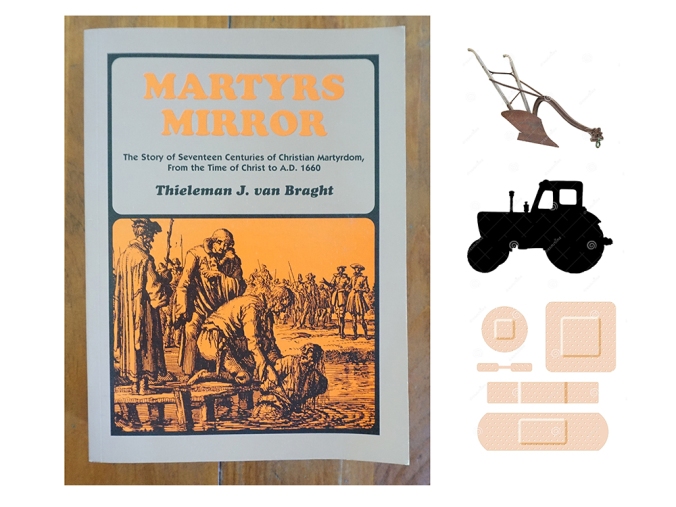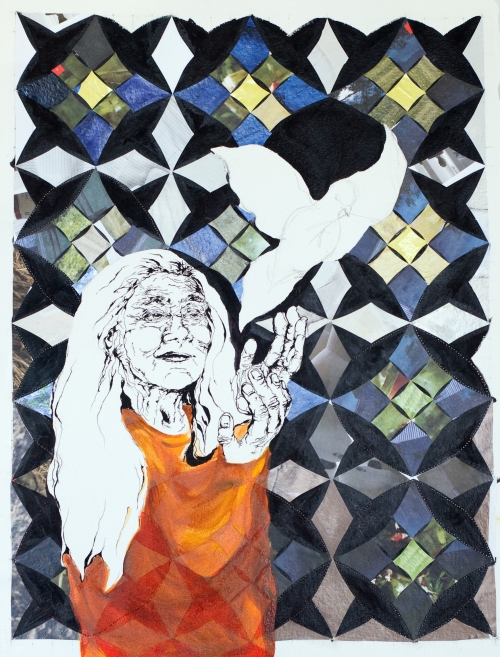Today I opened Facebook and read that they found MJ’s body in a grave in the Congo along with his Congolese and Swedish comrades. When I first heard he was missing, I feared for his life. I also held out hope because maybe as a white American he would be more valuable alive than dead, but at the end of the day white privilege and American citizenship didn’t save him.
We know that in a global context of international violence white lives matter more. Given our history of white supremacy, colonization, and European-centricity, we can easily trace the threads through time that explain how this has come to be. What we examine less is what would drive a young white Mennonite from the midwest—who could have lived a life of material comfort and physical safety—to risk all of that and place himself in the middle of some of the most dangerous conflicts in the world—to go directly to places where the locals are trying to leave.

Wars Abroad Wars at Home; Mixed Media by Amanda K Gross
My above words are slightly inaccurate. We do talk about it on some level. We glorify it. The Martyr. The Savior. The Hero who risks all to save others. MJ’s name will be written alongside of others who died in the name of peace – Dirk Willems, Gandhi, Rev Dr. Martin Luther King Jr., Jesus. MJ’s name will be spoken in Mennonite pulpits on Sunday. “Blessed are the peacemakers for they will be called children of God.” (Matthew 5:9) Some who hear his name will grieve because they knew and loved him. Some will be proud because he was “one of ours”. Some will be proud because he has kept up our reputation. (Mennonites are known for our farming, peacemaking, and our righteous dying.) Some will revere his name and his work because his sacrifice means that others won’t have to, that their children won’t have to, that they won’t have to.
But I believe that there is more to why young white expats* Mennonite and Other-than-Mennonite risk their lives in the name of peace. There’s more to it than the white savior complex, martyrdom syndrome and promise of humble glory. There’s more to it than a deeply embedded spiritual socialization of serving others and erasing motives of self.** While I think MJ and others (myself included) have definitely been influenced by these messages, there are other driving factors that we don’t talk about. There are other things at play that a lens of glorification would not have us see. And this is not to take away from the intrinsic value and awesomeness of MJ’s life and work. It is to complexify and complicate our one note melodies and turn them into narratives of harmonious dissonance.

Martyr’s Mirror, Plough, Tractor, Adhesive Bandages, courtesy of the internets
When I told my roommate that my college classmate had been kidnapped in the Congo she said (and I paraphrase), “Well what do you expect getting involved in other people’s wars. That white man had no business over there.” And she’s right. And she’s wrong.
She’s wrong because the wars in the Congo do not purely belong to the people of what is now known as the Democratic Republic of Congo. Those wars belong to us all. And I don’t mean in an esoteric kum-ba-ya “All wars are our wars. All people are our people.” kind of way. But in the way that white people in what is now the United States of America are intricately connected to the geopolitical how and why conflict in the Congo exists. This includes the history of colonization, the occupation of political rule by Europeans alongside the continued economic, cultural, and religious colonization by Europeans and North Americans (including Mennonites and other religious entities), and also the international corporate extraction and exploitation of the Congo and it’s natural resources and the militarized political influence of white westerners and their market capitalism driven by consumerism (also that of Mennonites as participants in North American consumerism) – to name a few.
She’s right though, because that is what one gets for interfering in other people’s wars. Her comment made me reflect on why I would ever deign otherwise. Why would I even expect someone who consciously and willingly planted himself in the middle of violent conflict to survive – to have a right to survive – to have the right to survive while at the same time expect all those born and raised in the context of war to most likely not survive? What part of me could exceptionalize MJ’s survival?
There is something deeper than “a call” that drives white expats into peacebuilding in war zones, that takes white missionaries to Kenya, that propels white college students into the industry of international development, that gives hundreds of thousands (maybe millions) of white folks employment doing “good work” in the inner cities via the NonProfit Industrial Complex (myself included).

This Land is White Land; quilted adhesive bandages and fabric by Amanda K Gross
We rush head first into other people’s wars because we are escaping our own.
It is easier to helicopter into a foreign conflict zone where we know no-one than to face the conflict zones of our homes. It is more alluring to negotiate the violent disputes of the Congo than to navigate the personal trauma of the rural U.S. It is better to run and deal with other people’s messes, no matter how dangerous they may be, than to hold up a mirror and confront and sit with the ugliness of our own. There is more hope in convincing Congolese rebels to put down their guns than to convince our conservative Republican fathers to give up their allegiance to whiteness.
I say this not to blame MJ, but to identify with him. The root causes of Congolese violence are intimately close to home, and staying engaged in either risks our emotional, spiritual, mental, and even physical health. Rather than see MJ’s journey as exceptional, as out there, as something that could only happen in the dangerous jungles of Africa—what if MJ’s journey was in fact parallel to our own? What if we approached engaging in our own context, with American whiteness, with being in relationship to our families, and dealing with the roots of this interconnected mess with the same purpose and courage that we will ascribe to MJ’s life?
And to take it one step further, what if we did so leaving the Martyrdom and Savior Complexes behind? What would that mean for those of us who are still in the land of the living?
MJ Sharp, you will be missed.

Fly Away Home (in progress): Mixed Media by Amanda K Gross
*expats=North Americans and Europeans and Australians living/working in Asia, Africa, and Latin American
**Erasing motives of self is a dangerous egotistical illusion that sets us up for doing more harm to others and also to ourselves out of the myth that in totally suppressing our own wants and desires we are practicing a sort of holy selflessness, rather than recognizing our wants and desires and discerning what of it is in alignment with God’s justice, mercy, and love, and rather than learning and trusting our deepest truths to be in alignment with God’s Truth. I blame dualism.